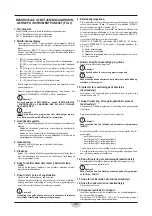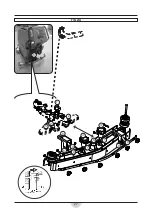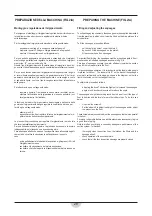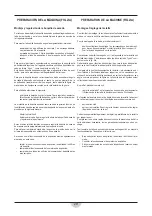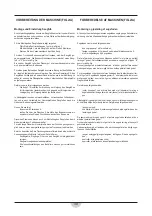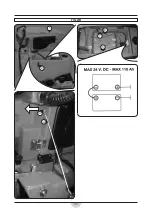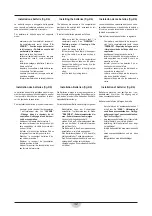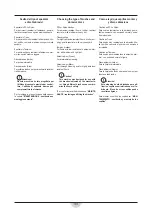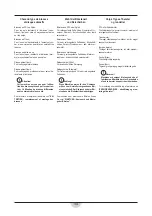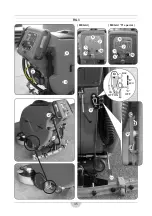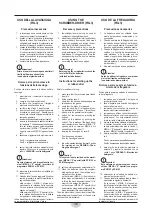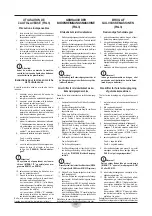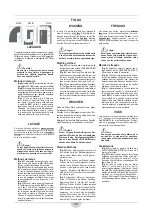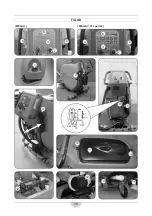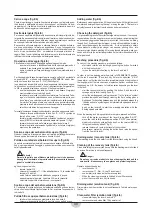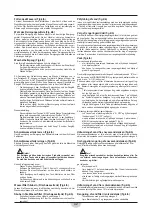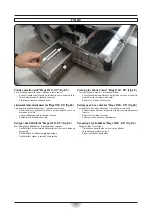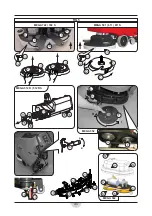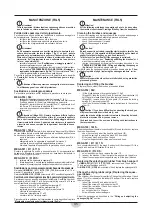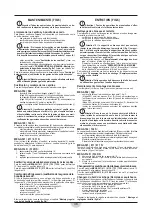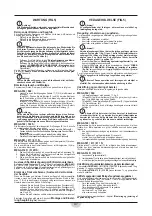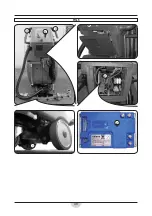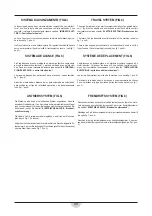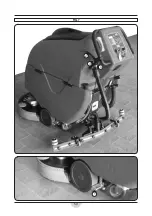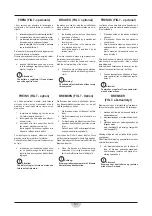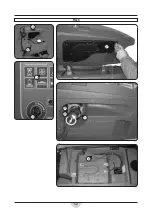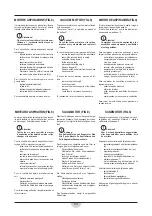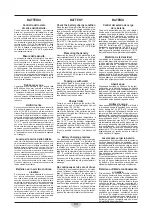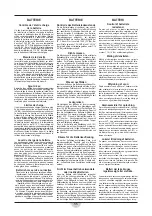
40
Carico acqua (fi g.4/b)
Prima di ogni lavaggio, riempire il serbatoio soluzione con la giusta quan-
tità di acqua e detergente aprendo il bocchettone 1 o utilizzando il tubo di
riempimento 2. Il serbatoio é costruito in polietilene, inattacabile da acidi e
basi nonché dalla maggior parte dei solventi.
Scelta detergente (fi g.4/b)
Per una buona pulizia del pavimento é necessario individuare il giusto de-
tergente. Se necessario farsi consigliare dal fornitore o da persona compe-
tente, tenendo presente che un detersivo troppo aggressivo puó risultare
dannoso per la durata della macchina e del pavimento.
É necessario utilizzare detersivo a schiuma frenata, o additivo antischiu-
ma, onde evitare danni al motore d’aspirazione. Se non fosse possibile
procurarsi tali prodotti, per evitare la schiuma, si puó utilizzare del comune
aceto di vino, versandone 50 cc. nel serbatoio di recupero prima del la-
vaggio. Dopo l’uso di tali detergenti, lavarsi le mani e fare riferimento alle
istruzioni contenute nelle schede del detergente stesso.
Operazione di lavaggio (fi g.4/b)
Per effettuare l’operazione di lavaggio agire nel seguente modo:
- inserire la rotazione e l’abbassamento delle spazzole premendo il
pulsante 3 contrassegnato dal simbolo della spazzola.
- aprire il rubinetto per l’acqua di lavaggio (soluzione) mediante leva 4
ed asta 5.
Per il dosaggio dell’acqua detergente agire sempre sull’ asta 5 portandola
su posizione “B” , si otterrà cosi un dosaggio INTERMEDIO quindi, bloc-
carla con la sua leva 4 su pos. “A - ON” (vedi in
fi
gura)
In questo modo la super
fi
cie, subito dopo le spazzole, risulterà ben bagna-
ta, evitando un eccesso di schizzi, rivoli o traboccamenti del tergipavimen-
to. NB: la quantità di soluzione varia con il livello nel serbatoio.
- Inserire l’aspirazione mediante il pulsante 6, e abbasare il tergipavi-
mento mediante leva (vedi
fi
g.3 poc.8).
- selezionare la velocità, ruotando il commutatore 7 sul simbolo “tarta-
ruga” si ottiene una velocità bassa e una pulizia accurata, sulla posi-
zione “lepre” una velocità elevata per i trasferimenti o sulla posizione
fra i simboli “tartaruga e lepre” una velocità e una pulizia intermedia.
- premere le leve 8 per consentire l’avanzamento della lavasciuga alla
velocità voluta inziando l’operazione di lavaggio.
Terminata l’operazione di lavaggio ed asciugatura, procedere nel seguente modo:
- Chiudere l’acqua posizionando la leva 4 su “A - OFF” e spostando
l’asta 5 a
fi
ne corsa “C - OFF” (vedi
fi
gura).
- fermare la rotazione delle spazzole premendo il pulsante 3, nella ver-
sione ( MEGA I ) sollevare le spazzole mediante il pedale 11 (
fi
g.3).
- fermare l’avanzamento della lavasciuga, rilasciando le leve 8.
- fermare l’aspirazione premendo il pulsante 6; e sollevare il tergipavi-
mento con l’apposita leva.
Scarico acqua dal serbatoio di recupero (fi g.4/b)
Quando il serbatoio di recupero è pieno o al termine del lavaggio scaricare
l’acqua sporca dal serbatoio di recupero tramite il tubo 9.
Pulizia accurata del serbatoio di recupero (fi g.4/b)
La pulizia accurata del serbatoio di recupero deve essere effettuata alla
fi
ne di ogni operazione di lavaggio, o quando la macchina non viene utiliz-
zata frequentemente.
!
Pericolo!
Durante la pulizia non utilizzare prodotti corrosivi che possono
dannegiare il serbatoio e la propria salute. É necessario indossare
guanti e occhiali di protezione.
agire nel seguente modo:
- ruotare i pomelli 10.
- rimuovere il coperchio 11, il
fi
ltro abbattischiuma 12, la vaschetta di
recupero 13 e pulirli.
- pulire l’interno del serbatoio utilizzando una getto d’ acqua.
- appena terminata la pulizia, rimontare il
fi
ltro e la vaschetta.
- rimontare il coperchio e fermarlo con i suoi pomelli.
Scarico acqua dal serbatoio soluzione (fi g.4/b)
É Consigliato lo scarico dell’acqua dal serbatoio soluzione quando la mac-
china non viene utilizzata frequentemente. Per scaricare l’acqua aprire il
rubinetto 14.
Pulizia fi ltro acqua (serbatoio soluzione) (fi g.4/b)
- chiudere il rubinetto acqua mediante la leva 4 ed asta 5.
- rimuovere la vaschetta del
fi
tro 15 e pulirlo con un getto d’acqua.
Adding water (fi g.4/b)
Before each cleaning operation,
fi
ll the solution tank with the right amount
of water and detergent opening the cap 1 or using the pipe 2. The tank is in
polyethylene and is resistant to acids, bases and most solvents.
Choosing the detergent (fi g.4/b)
For good cleaning results the correct detergent must be used. If necessary,
request advice from the supplier or a competent person, remembering that
an excessively aggressive detergent may shorten the machine’s working
life and
fl
oor. A reduced foam detergent, or an anti-foam additive, must be
used to avoid damage to the suction motor. If it is not possible to obtain
these products, ordinary wine vinegar can be used, pouring 50 cc. into
the recovery tank before washing. After using these detergents, wash your
hands and refer to the instructions provided on the information sheet of the
detergent itself.
Washing procedure (fi g.4/b)
To carry out the washing procedure, proceed as follows:
- start brush rotation and lowering by pushing the button 3 marked
with the brush symbol.
- turn on the water (solution) tap, by the lever 4 and rod 5
In order to set the cleaning water
fl
ow-rate in INTERMEDIATE position,
set the rod 5 on position “B” and lock it by its lever 4 on position “A”-ON”
(see picture), so that the whole surface immediately behind the brushes is
thoroughly wet, but there is no excess of splashes, spills or over
fl
ows from
the squeegee. N.B. the amount of solution varies depending on the level
in the tank.
- start the vacuum system by pushing the button 6, and lower the
squeegee by its lever (see
fi
g.3 pos.8).
- select the working speed, turning the switch 7 to the “tortoise” symbol
provides low speed and thorough cleaning, the “hare” setting gives a
high speed for travelling between jobs and the position between the
“tortoise and hare” symbols gives an intermediate speed and level of
cleaning.
- push on the levers 8 to start the washing operation with the
driving speed selected.
When the washing and drying operation is complete, proceed as follows:
- turn off the water by means of the lever 4 in position “A-OFF”,
move the rod 5 to fully back down position “C-OFF” (see picture).
- stop brush rotation by pushing the button 3, on the version ( MEGA I )
lift up the brushes by pedal 11 (
fi
g.3).
- release the levers 8 to stop the travel of the scrubber .
- stop vacuum system by pushing the button 6 and raise the squee-
from the
fl
oor by its lever.
Draining water (recovery tank) (fi g.4/b)
After washing, drain the dirty water from the recovery tank using the hose 9.
Cleaning of the recovery tank (fi g.4/b)
Clean accurately the recovery tank every time the washing-work is
fi
nished
or in case if machine is not used frequently.
!
Danger!
Do not use corrosive products to do not damage the tank and the
own health. It is necessary to use gloves and protection glasses.
Operate as described below:
- turn the knobs 10.
- remove cover 11 ,
fi
lter 12, cup 13 and clean it.
- use a water jet to clean inside the recovery tank
- When the cleaning procedure is
fi
nished, mount
fi
lter and cup.
- mount the cover and lock it by its knobs.
Draining water (solution tank) (fi g.4/b)
Drain water when the machine is not used frequently. To drain water, open
the tap 14.
Clean water fi lter (solution tank) (fi g.4/b)
- close water tap by the lever 4 and rod 5
- remove cover and clean
fi
lter 15 by a water jet.
Summary of Contents for 33.MG.101
Page 27: ...27 FIG 2 A 6 3 3 6 8 8 4 2 2 7 1 1 5 8 9 9 ...
Page 31: ...31 FIG 2 B 1 5 6 7 2 4 3 ...
Page 48: ...48 FIG 6 3 3 4 1 2 2 ...
Page 50: ...50 FIG 7 1 2 3 4 ...
Page 52: ...52 FIG 8 5 4 2 3 1 6 7 8 9 ...
Page 56: ...56 FIG 9 3 4 A 3 4 A 1 8 9 10 11 12 7 6 MEGA I MEGA I S special 2 2 5a 5b ...
Page 74: ...74 FIG 12 4 3 1 2 ON OFF ON OFF KIT A KIT B 7 7 6 5 8 8 MEGA I S special ...

